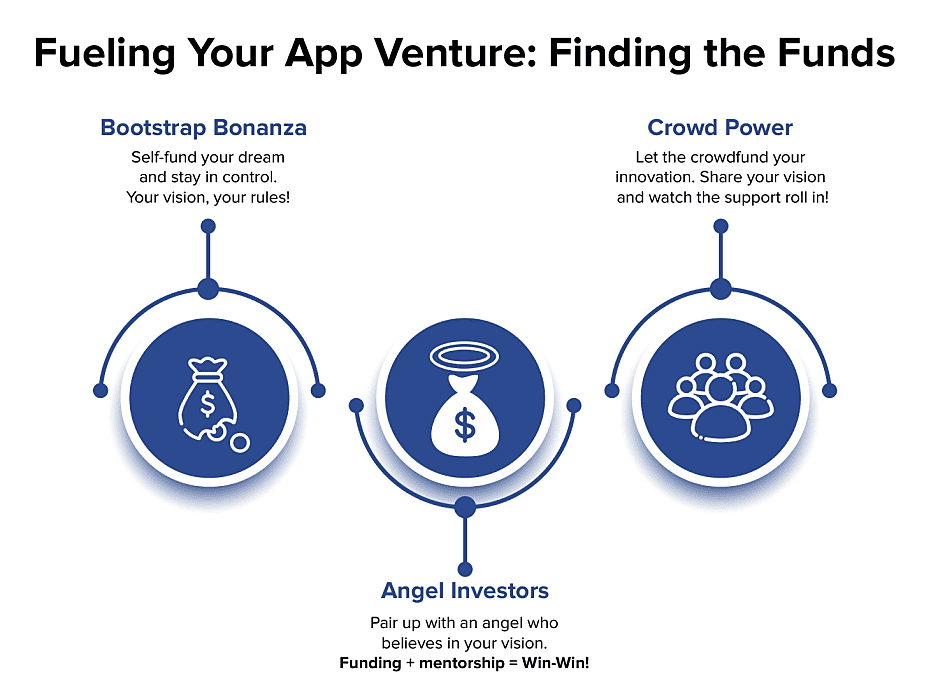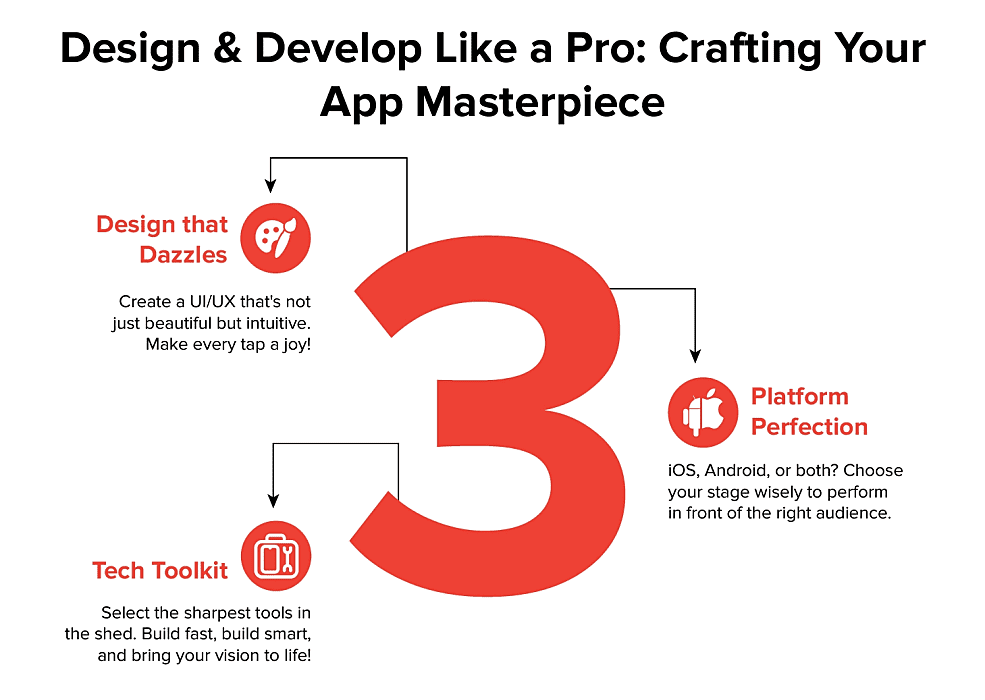
-
The Journey to Build Your App Business
- Step 1: Identify the existing problem in the target market
- Step 2: Conduct an in-depth market research
- Step 3: Create a budget for starting an app business plan
- Step 4: Prepare an app business revenue model
- Step 5: Curate your funding options
- Step 6: Design and develop your app
- Step 7: Test your app
- Step 8: Curate a marketing strategy
- Step 9: Launch your app
- Step 10: Collect user feedback and iterate
- Step 11: Scale your business
- Step 12: Maintain legal and financial compliance
- Step 13: Build a community
- Successful app business case studies to get inspired from
- Wrapping up

With more than 257 billion apps downloaded in just 2023, the potential to succeed and grow is huge. Our guide, "How to Start an App Business" is perfect for businesses ready to dive into this opportunity.
We've put together a clear app business checklist that covers everything from the early planning stages to launching your app. It's designed for both big companies looking to expand and startups eager to launch their first app.
Let's dive into the essentials of starting your app business with confidence. Read on to discover how you can turn your app idea into a reality and stand out in the digital market.
The Journey to Build Your App Business
Step 1: Identify the existing problem in the target market
Find the problem that requires solving. This could be something you've personally experienced or noticed within a specific user group or something you often hear about around you. If you build an app to solve an existing problem, it can be great to motivate the app’s popularity in the target market.
Step 2: Conduct an in-depth market research
For an effective growth strategy, you need to learn from your competitors. Conduct in-depth market research, understand the target audience, explore tech trends in the market, and find statistics that are relevant to your app idea
The following strategies can help you organize thorough research to start an app-based business
- Surveys- Organizing online surveys is one of the most popular methods businesses use to collect data. There are several survey apps existing in the market. These apps can help you organize surveys from your smartphone. Surveys often include well-planned questions that are helpful in identifying problems, understanding the target market demographics, and more.
- Interviews- Interviewing potential app users can be great for building an app that users want. You can also interview industry experts for some critical insights. These critical insights can help you plan your business, understand its potential, and find growth opportunities.
- Observation- Observing the way users interact with an app is good for understanding their response to your potential app idea. You can look for the apps from the relevant industries that are key players in the market. Explore app engagement metrics to find out how these apps are performing. You can use app analytics tools to find the overall traffic, pages with higher engagement, popular features, and more.
Step 3: Create a budget for starting an app business plan
Planning a tentative budget is one of the crucial steps to start an app business. This budget covers everything from development, marketing, and operation to salaries and legal advice. A detailed budget helps you secure the right funding, oversee your finances smoothly, and set achievable goals as your app grows.
Step 4: Prepare an app business revenue model
When building an app business, one of the first steps is figuring out how your app will bring in revenue. This is crucial before you jump into developing and marketing your app. You'll need to choose a revenue model that fits well with what your app does and what your users want. Your revenue model will also help you find the right business funding.
There are a few popular ways covered under the proven tips to improve app revenues. For instance-
- You might choose a subscription model, where users pay regularly to use your app
- Or, you could offer in-app purchases, letting users buy extra features or content
- Another option is showing ads within your app, which can earn you money while keeping the app free for users
- There's also the freemium model, where the basic app is free, but users can pay for premium features
Picking the right way to make money is about more than just profits. It helps you plan your finances and guides important choices about your app's design and user experience. By carefully choosing your revenue model early on, you set up your app business for success, ensuring it can grow and thrive.
Step 5: Curate your funding options

The process to create an app business requires a well-planned budget. Depending on your app’s vision, there are several funding options you can choose from. Let’s have a look!
- Bootstrapping- If you plan to start your own app business from your money, it’s called bootstrapping. This funding model helps you keep full control of your business operations. However, bootstrapping might slow down your business growth based on how much money you can invest.
- Angel Investors- These affluent individuals provide capital for a business start-up. They are often retired entrepreneurs or executives. By accepting angel investment to create an app business, you also get expertise and mentorship from industry veterans.
- Crowdfunding- Platforms like Kickstarter or Indiegogo allow you to raise small amounts of money from many people. You can raise these funds in exchange for early access to your product, rewards, or equity. This method validates your idea in the market and generates early adopters.
- Venture Capital- If you are building an app business, raising venture capital is also an option you can pick. Venture capital firms provide significant funding to startups they believe have high growth potential in exchange for equity. These firms are focused on the future profit they can earn by selling their share in your business.
- Government Grants and Loans- Some government programs offer grants and loans to startups, especially those in specific industries or contributing to social, environmental, or technological advancements. These are typically non-dilutive funds, meaning you don't have to give up equity in your company.
Step 6: Design and develop your app

Once the research process is done, it is time to plan your app. The planning phase will include steps like wireframing the app, picking the right technologies, and more. Let’s dive deeper-
Design and Wireframe your app
When you're planning to start your own app business, you need an innovative app design. This is where you decide how your app looks and feels to users. It's important to keep up with the latest UI trends, so your app is easy and enjoyable to use.
UI (User Interface) is about the look of your app, like the colors and buttons. UX (User Experience) is about how people interact with your app. Making sure your app follows current trends in UI/UX helps it stand out and keeps users coming back.
Pick an ideal platform to deploy your app
An Exploding Topics report suggests there were over 57.93% iOS users and over 41.64% Android users in the USA in 2023. Exploring such stats helps you understand the commonly used smartphone platform in the target market.
Picking a widely available platform across target groups helps you multiply your app’s growth further. Some commonly available types of apps that exist in the market are-
- Native apps- Apps that are built for specific platforms, such as Android or iOS, are called Native apps. If your app ideas for starting a business include targeting multiple platforms, Native app development can be costly. However, native apps are known for their performance supremacy.
- Hybrid apps- The major difference between hybrid and native apps is their compatibility with multiple platforms. Hybrid apps are scalable and built for multiple smartphones. These apps are cheaper to develop and require less time to deploy. However, hybrid apps are behind native apps in terms of performance.
- PWAs- Progressive Web Apps (PWAs) are used on web browsers. PWAs can work offline, receive push notifications, and access device hardware, thanks to modern web technologies like service workers and manifest files.
Pick the best app development tools
Getting the right tools ready for building your app is a key step. You need to choose the programs and platforms that fit what your app needs to do and where you want it to go. Think about how complex your app will be and who it's for—like if it's just for iPhone users or everyone.
Using popular and powerful app development tools recommended by mobile app development companies in the USA, the UK, India, etc, can help. The right tools can make creating your app easier, make it work better, and help your team get things done faster. Whether you're deciding on tools made just for iPhone apps, Android apps, or ones that work for both, the right choice lays the groundwork for a successful app build.
Step 7: Test your app
The app development industry is flooded with app testing tools. It is critical that you test your app before introducing it to the world. Testing your app ensures that the app works flawlessly and each of its features is accessible. Depending on the availability of resources, you can choose from automated or manual app testing. Some other types of testing recommended by the leading Android app development companies are-
- Functional Testing: To verify that all features work as intended.
- Usability Testing: To ensure the app is easy to use and navigate.
- Performance Testing: To check the app's speed, responsiveness, and stability under different conditions.
- Security Testing: To protect user data and prevent vulnerabilities.
- Compatibility Testing: To make sure the app runs smoothly on different devices, operating systems, and screen sizes.
Step 8: Curate a marketing strategy
Develop a comprehensive marketing plan that outlines how you will attract users to your app. Prepare a marketing campaign that considers the 7 Ps of marketing that can help you attract good ROIs.
Alternatively, you can partner with app marketing companies to get some expert help. These companies are well-versed in utilizing the leading app marketing trends to help your business grow in the long term.
Step 9: Launch your app
Launching your app is a pivotal moment in your app business journey. A strategic launch plan is essential for making a strong entrance into the market. Here are key components to consider:
- Pre-launch Campaign: Generate anticipation by teasing the app's features, benefits, and launch date through social media, email newsletters, and press releases.
- Launch Day Activities: Coordinate with bloggers, influencers, and media outlets to create buzz around your app on the day of launch. Consider hosting a virtual launch event to engage potential users.
- ASO: App Store Optimization (ASO) includes optimizing your app's title, keywords, description, and screenshots to improve visibility in app stores.
- User Onboarding: Ensure a seamless onboarding process for new users to maximize retention rates.
Use a mobile app launch checklist to cover all critical aspects, including last-minute testing, marketing materials readiness, and support team preparation.
Step 10: Collect user feedback and iterate
After launching your app, actively seek out user feedback through surveys, app reviews, and social media platforms. You can leverage user reviews for higher app retention rates. Key areas to focus on include:
- Feature Requests: Prioritize new features based on user demand.
- Bug Reports: Address and fix reported issues promptly to maintain user trust.User Experience Enhancements: Continuously refine the UI/UX based on user suggestions to ensure your app remains competitive and appealing.
Step 11: Scale your business
Scaling your app business is about leveraging its current success to achieve greater growth. Consider the following strategies:
- Market Expansion: Explore new geographic markets or target audiences that could benefit from your app.
- Feature Expansion: Develop additional features or services that complement the core functionality of your app, based on user feedback and market research.
- Partnerships: Form strategic partnerships with other businesses to cross-promote services or integrate complementary features.
Scaling requires careful planning to ensure that your infrastructure, team, and marketing strategies can accommodate growth.
Step 12: Maintain legal and financial compliance
As your app business grows, so does the complexity of legal and financial obligations. Stay vigilant in areas such as:
- Data Protection: Adhere to regulations like GDPR or CCPA to protect user data.
- Intellectual Property: Protect your app’s IP and respect the IP rights of others.Financial Reporting: Keep accurate records for taxation purposes and monitor your financial health.
Regularly consulting with legal and financial experts can help you navigate these responsibilities and avoid potential pitfalls.
Step 13: Build a community
Building a vibrant community around your app not only fosters user loyalty but also turns users into advocates. Engaging with your community and keeping them updated also stand among the steps to start a successful app business.:
- Social Media: Create and share content that resonates with your users, encouraging interaction and feedback.
- User Events: Host webinars, meetups, or online forums where users can learn, share experiences, and connect.
- Exclusive Offers: Reward your community with early access to new features, discounts, or special content.
Successful app business case studies to get inspired from
Take app ideas for starting a business from real maestros. Let’s explore the top three case studies before we wind up the blog:
- Instagram: In 2010, Instagram started as a simple app for sharing photos. Founders Kevin Systrom and Mike Krieger made it easy to use, focusing on square images. By 2012, it had 100 million users. Facebook noticed its success and bought it for $1 billion. Now, Instagram has become one of the best social media platforms, with over a billion users. It's a place where people, businesses, and creators share their stories.
- Uber: Uber began in 2009, changing how we get around cities. Founders Garrett Camp and Travis Kalanick made it easy to find rides with an app. By 2011, Uber was growing around the world, starting in Paris. Despite challenges, Uber kept growing and went public in 2019. Today, it works in 69 countries and has completed billions of rides, making it one of the best ride-sharing apps in existence.
- WhatsApp: WhatsApp was created in 2009 by Jan Koum and Brian Acton. It lets people message each other over the internet for free. It was easy and safe to use, quickly gaining users worldwide. By 2014, 450 million people were using it every month. Facebook bought it for $19 billion. Now, over 2 billion people use WhatsApp, making it one of the top messaging apps to stay in touch.
Wrapping up
Starting an app business today is an exciting adventure. Mobile apps are now a key part of how companies grow, offering a great chance to make something that really helps people. This guide has walked you through every important step, from finding a problem to solve, doing your research, setting up your budget to building and launching your app and then growing your community.
Digital transformation is heavily influencing the modern consumer, bringing new chances and challenges for app development experts. But with a strong plan, focusing on your users, and always looking to get better, you're set to navigate these changes successfully.
So, dive into the journey of creating your app business, where your ideas meet real-world needs and open doors to new possibilities. Apart from this guide answering the question “how to start an app business,” there are several mobile app development companies from which to get inspiration. Explore their work ethics and development strategies, and get inspired to build innovative solutions.
Frequently Asked Questions
-
What does it take to start an app-based business?
To kick off an app business, start with a solid idea aimed at solving a specific problem for your users. You'll also need:
- Market Research: Know your competition and understand what your users really need.
- Business Plan: Outline how your app will make money, who it's for, and how you'll tell people about it.
- Technical Stuff: Pick the right tools and tech. Design your app to be user-friendly and test it to make sure it works well.
- Launch and Grow: Promote your app to get users and keep improving it based on their feedback.
-
How much will it cost to start and run an app business?
-
How can app development companies in the UK, India, etc help with starting an app business plan?
-
Does owning an app business make money?


















